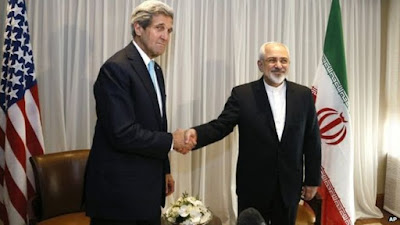 |
| John Kerry and Javad Zarif - also known as "Give and Take" |
According to a recent article by David Wainer for Bloomberg, U.S. Warns Wary UN Security Council on Iran Ballistic Missiles, the United States is calling on the United Nations Security Council to take action against Iran for its continued ballistic (and cruise) missile research and development program.
A letter from Ambassador Jonathan Cohen, the acting U.S. representative to the body, claimed that Iran “has conducted several activities that defy” a UN resolution urging it to refrain from actions related to “ballistic missiles designed to be capable of delivering nuclear weapons.”
Ambassador Cohen is referring to UNSCR 2231 of July 2015 which was adopted as the United Nations agreed to the disastrous Joint Comprehensive Plan of Action (JCPOA), the so-called Iran nuclear deal.
Cohen's letter claims that any UN member state supporting Iran’s ballistic missile program is in violation of the resolution, that all members “have an obligation under that resolution not to supply, sell, or transfer to Iran ballistic missile-related items, materials, equipment, goods, and technology absent advance, case-by-case approval from the Security Council.”
Pushing back against the American letter, Russia and China - both permanent members of the Security Council with veto power - noted, correctly in my opinion, that UNSCR 2231 does not prohibit Iran from testing ballistic missiles, as UNSCR 1929 (June 2010) did.
UNSCR 1929 stated that "Iran shall not undertake any activity related to ballistic missiles...." The new resolution, watered down at Iran's request, states that Iran is "called upon not to" develop ballistic missiles.
Thank you, John Kerry
Yes, it was the terminally ineffective John Kerry who caved in to Iran's demands to alter the wording of UNSCR 1929. In Kerry's negotiations (and I use the word reluctantly) with Iranian Foreign Minister Javad Zarif - or as I call the duo, "Give and Take" - he agreed to the change, claiming that the new words carried the same restrictions as the former wording.
I am not a lawyer (John Kerry is), but even I know the difference between "shall not" and "called upon not to." Evidently, Kerry does not. Here is an exchange between then Secretary of State Kerry and Senator Robert Menendez (D-NJ) of the Senate Foreign Relations Committee:
SENATOR ROBERT MENENDEZ: Mr. Secretary, I'm seriously concerned about the lifting of the arms embargo that creeped its way into this deal. As I read the Security Council resolution on page 119, the ban on Iranian ballistic missiles has, in fact, been lifted. The new Security Council resolution is quite clear. Iran is not prohibited from carrying out ballistic missile work. The resolution merely says, quote, "Iran is called upon not to undertake such activity." Previously, in Security Council Resolution 1929, the council used mandatory language where it said, quote, "It decides that Iran shall not undertake any activity related to ballistic missiles capable of delivering nuclear weapons." Why would we accept inferior language that changes the mandatory shall to a permissive call upon. We often call upon a lot of countries to do or stop certain actions in the U.N., but it doesn't have the force of shall not which has consequences if you do. Can you answer simply, is Iran banned from ballistic missile work for the next eight years?
SECRETARY KERRY: That is not accurate. The exact same language in the embargo is in the agreement with respect to launches. And that is under Article 25 of the U.N. And that is exactly where it is today in the language. But in addition to that, Iran did not want it, and we insisted on it. They are restrained from any sharing of missile technology, purchase of missile technology, exchange of missile technology, work on missiles. They cannot do that under Aticle 41, which is Chapter VII and mandatory. And it does have the language still.
MENENDEZ: It seems -- I'm reading to you from the Security Council resolution that was adopted, codifying the...
KERRY: Yes, this agreement. The security council resolution.
MENENDEZ: And that security council resolution says Iran -- Mr. Secretary, I'm reading you explicit language. I'm not making this up. Iran is called upon...
KERRY: Correct.
MENENDEZ: ... not to undertake...
KERRY: That's the article 25, it's exactly what it is.
MENENDEZ: That's far different than shall not.
KERRY: Senator, that's exactly what it is today. It's the same language as it in the embargo now. We transferred it to this and that's what it is.
MENENDEZ: Not the same language as Security Council resolution 1929.
It goes on, but you get the idea. While Secretary Kerry may not grasp the difference, the rest of the world has. A sane person believes that John Kerry either wanted to make a deal with the Iranians no matter what the cost, or that he does not grasp the difference between "shall not" and "called upon not to." Perhaps both are true.
The Iranians obviously know the difference between the two phrases, and have exploited that Kerry-provided loophole to continue their aggressive missile research and development program. They now have the support and protection of the Russians and Chinese.
Thanks, John Kerry.
Tweet

